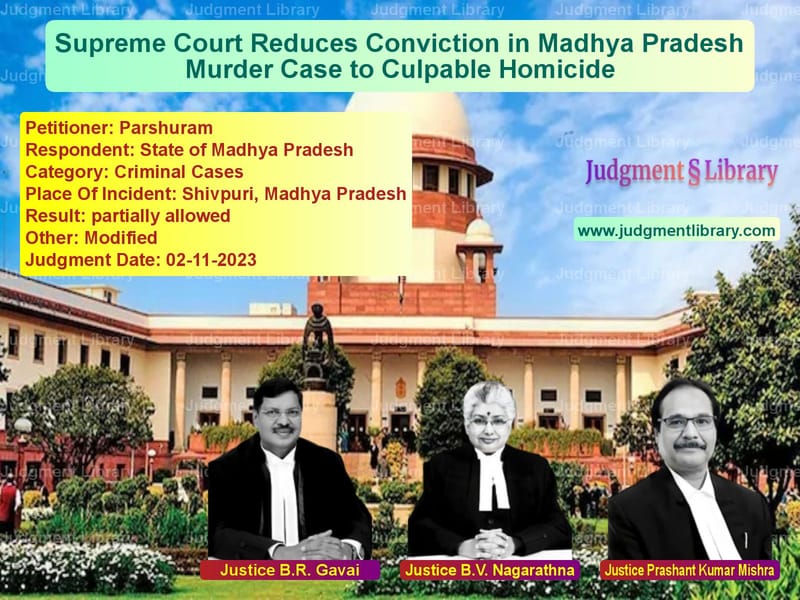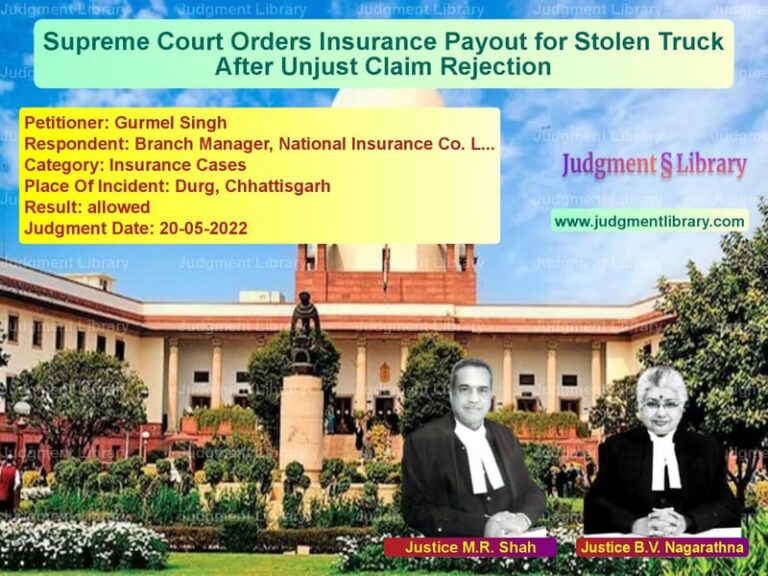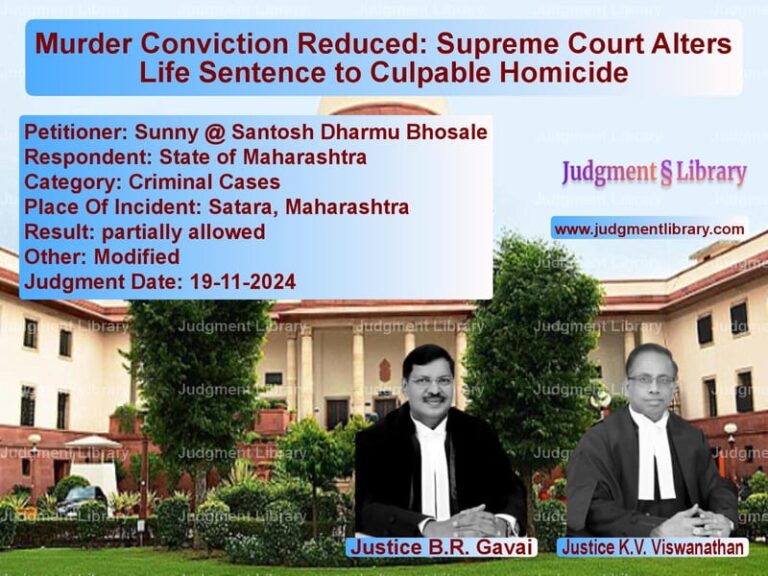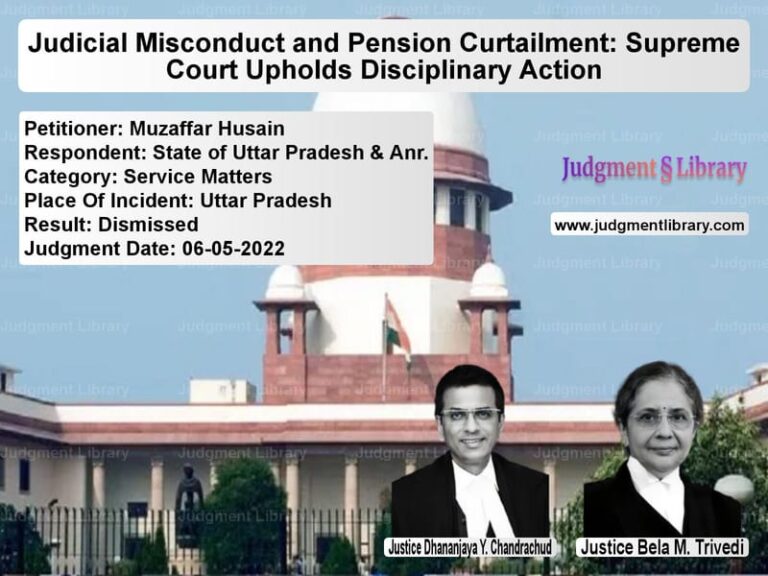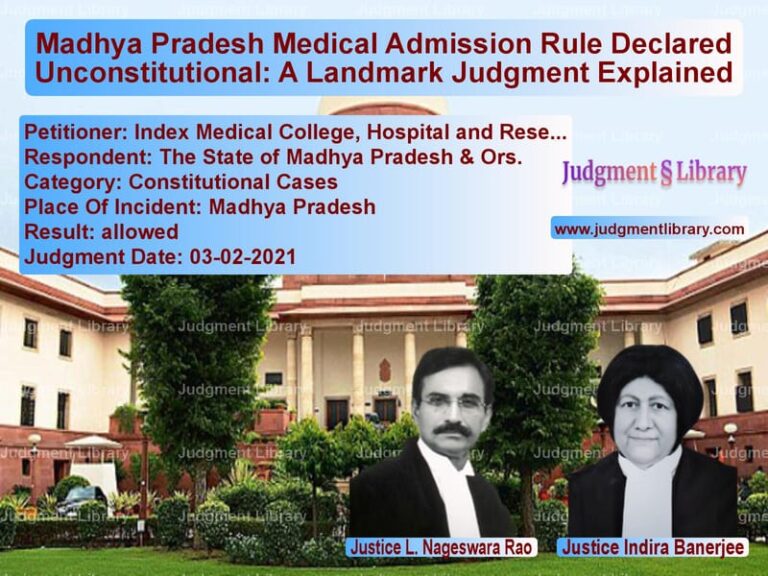Supreme Court Reduces Conviction in Madhya Pradesh Murder Case to Culpable Homicide
The Supreme Court of India recently ruled in Parshuram v. State of Madhya Pradesh, a significant case involving a long-standing criminal dispute that resulted in the death of an individual. This case revolved around an altercation stemming from a property dispute, where multiple individuals were charged under Section 302 read with Section 149 of the Indian Penal Code (IPC) for murder. However, after thorough judicial scrutiny, the Supreme Court modified the conviction to culpable homicide not amounting to murder under Section 304 Part II IPC.
Background of the Case
The case originated in Shivpuri, Madhya Pradesh, where an altercation over a property dispute led to the death of one individual and injuries to several others. The appellant, Parshuram, along with other co-accused, was convicted by the trial court under Section 302 read with Section 149 IPC and sentenced to life imprisonment. The conviction was upheld by the Madhya Pradesh High Court.
The accused were part of an unlawful assembly that attacked the complainant party using lethal weapons such as barchi, sword, spear, lathi, and country-made bombs. The violence resulted in the death of Madan, and serious injuries to others, including members of the complainant’s family.
Prosecution’s Allegations
The prosecution’s case was that on October 6, 2001, the accused, led by Jalim Singh, confronted the complainant party and launched an attack. The sequence of events as per the prosecution:
- The complainant’s buffalo damaged a shed (taparia) belonging to the accused, leading to a dispute.
- The accused, including Parshuram, armed themselves and stormed the complainant’s house, attacking members of the family.
- On the next day, while the complainant party was on their way to the police station in a tractor, they were intercepted by the accused, who attacked them.
- Ram Lakhan, one of the accused, stabbed Madan with a barchi in the chest, causing his death.
- Other accused, including Parshuram, inflicted grievous injuries on the complainant party.
Arguments by the Appellants
The appellants, including Parshuram, argued that:
- They were falsely implicated due to an ongoing land dispute.
- They did not play a direct role in causing Madan’s death.
- The prosecution failed to explain the injuries suffered by the accused, raising doubts about the credibility of witnesses.
- The altercation was a free fight, with injuries inflicted on both sides.
- There was no clear evidence proving that the accused intended to kill Madan.
Respondent’s Arguments
The State of Madhya Pradesh, represented by the prosecution, contended:
- The accused were part of an unlawful assembly and acted with a common intention to harm the complainant party.
- Eyewitnesses clearly identified the accused as active participants in the assault.
- The trial court and High Court had correctly convicted the accused under Section 302 IPC.
- There was no justification for reducing the sentence, as the attack was premeditated.
Supreme Court’s Analysis
1. Non-Explanation of Injuries on the Accused
The Supreme Court noted that the prosecution failed to explain the injuries suffered by the accused. Referring to precedents such as State of Rajasthan v. Madho and State of M.P. v. Mishrilal, the Court held that non-explanation of injuries raises doubts about the fairness of the prosecution’s version.
Read also: https://judgmentlibrary.com/supreme-court-revises-conviction-in-rajasthan-murder-case-key-takeaways/
2. Common Intention and Section 149 IPC
The Court reaffirmed that under Section 149 IPC, all members of an unlawful assembly are held liable for offenses committed in furtherance of the common object. However, it examined whether the common intention was to commit murder.
3. Conversion to Section 304 Part II IPC
The Court observed:
“The prosecution has failed to prove beyond reasonable doubt that the unlawful assembly had an intention to cause the death of the deceased. As such, we find that the case would fall under Part II of Section 304 of IPC.”
The Court reasoned that:
- The altercation began over a minor property dispute.
- The accused did not appear to have a premeditated plan to kill Madan.
- The injuries inflicted by some accused were not fatal.
- The nature of the attack suggested it was more of a scuffle than a planned murder.
Final Judgment
The Supreme Court modified the conviction as follows:
- The conviction under Section 302 IPC was altered to Section 304 Part II IPC.
- The accused were sentenced to 7 years of rigorous imprisonment.
- All other convictions under Sections 326, 324, 323, and 148 IPC remained unchanged.
This ruling highlights the importance of evaluating intent in criminal cases and ensuring that culpability is assigned based on actual participation in the crime. By reducing the charge from murder to culpable homicide not amounting to murder, the Supreme Court recognized the complexity of the incident and the need for a nuanced approach in sentencing.
Read also: https://judgmentlibrary.com/supreme-court-restores-bail-of-purushothaman-high-courts-order-quashed/
Petitioner Name: Parshuram.Respondent Name: State of Madhya Pradesh.Judgment By: Justice B.R. Gavai, Justice B.V. Nagarathna, Justice Prashant Kumar Mishra.Place Of Incident: Shivpuri, Madhya Pradesh.Judgment Date: 02-11-2023.
Don’t miss out on the full details! Download the complete judgment in PDF format below and gain valuable insights instantly!
Download Judgment: parshuram-vs-state-of-madhya-prad-supreme-court-of-india-judgment-dated-02-11-2023.pdf
Directly Download Judgment: Directly download this Judgment
See all petitions in Murder Cases
See all petitions in Attempt to Murder Cases
See all petitions in Bail and Anticipatory Bail
See all petitions in Custodial Deaths and Police Misconduct
See all petitions in Extortion and Blackmail
See all petitions in Judgment by B R Gavai
See all petitions in Judgment by B.V. Nagarathna
See all petitions in Judgment by Prashant Kumar Mishra
See all petitions in partially allowed
See all petitions in Modified
See all petitions in supreme court of India judgments November 2023
See all petitions in 2023 judgments
See all posts in Criminal Cases Category
See all allowed petitions in Criminal Cases Category
See all Dismissed petitions in Criminal Cases Category
See all partially allowed petitions in Criminal Cases Category

